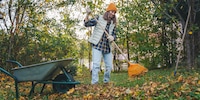
Guide
Take a leaf out of my book: 5 ways to reuse leaves in the garden
by Darina Schweizer

Separating your biodegradable waste from other rubbish is sustainable, eco-friendly and a great way to do your bit. But not all organic waste is fit for the compost. Find out which kitchen and garden waste is dying to decompose and which is complete rubbish.
Whether you collect your green waste in a small box tucked away under the sink or in a large container in your garden – you’re doing good. Collecting kitchen and garden waste comes with several advantages. Firstly, you’re giving your leftovers a second life and reusing them wisely. Either as fertiliser or for free use for your town’s green waste disposal. Secondly, you’re turning organic waste into natural humus for your garden. This is a great way to give mother nature back some of those important nutrients you snatched from her. The production of biogas is also a way to get something out of your compost. However, to make sure your green waste isn’t going to waste, here are some things you should keep in mind.
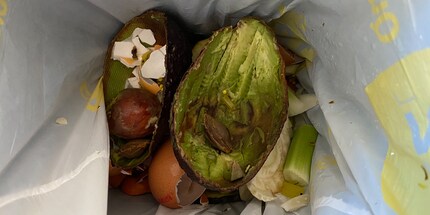
The first rule of composting is to chop up large bits into the size of about a finger’s length. Particularly hard fibrous organic waste, such as twigs and thick branches, take longer to rot and must therefore be broken up. Green waste with a hard shell or husk needs to be crushed. Make sure to remove any non-organic material such as bits of plastic packaging.
A compost heap in the garden
If you have a compost heap in your garden, the top layer should be mixed with all kinds of green waste. It’s also advisable to alternate layers of damp kitchen waste with more solid dry garden waste. This type of layering prevents anaerobic fermentation and the bad smells that go with it. The layers also speed up the decomposition of your green waste. Plus, the fresh waste is not lying at the top, stinking away or attracting animals. Pick a free-standing, airy spot for your compost heap. Bacteria, microorganisms and also larger organisms such as worms will take it from there and decompose the compost step by step. All they need in return is oxygen, warmth and moisture. Avoid compressing your waste too much and loosen up your compost from time to time, it will decompose faster that way.
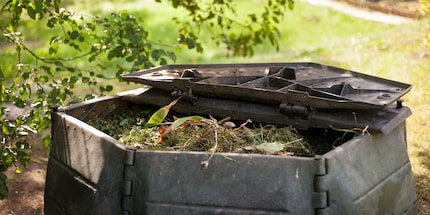
The green bin in front of your house
A container for green waste that’s parked in front of your house should close very well. Worst case, just plonk a stone on top of it to keep the lid down. This will prevent unpleasant odours from wafting out, attracting unwanted flies ready to lay their eggs. Your waste is already maggot infested? Yep, that looks really unappetising. But don’t worry, it’s not harmful. Cover the maggots with a layer of earth to stop them from crawling out of your green bin. Whatever you do, don’t use chemical insecticide, as it will contaminate your compost and render it useless. Clean your green bin with a hose and let it dry in the sun.
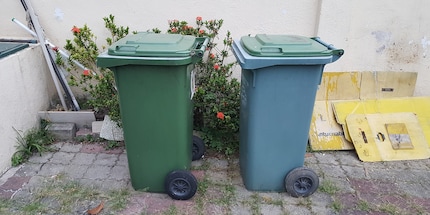
The kitchen compost box
As kitchen compost bins are small, you don’t have to worry about mixing up the waste inside. Empty the box every three days to prevent mould from forming, which could contaminate the air. The kitchen box is just a temporary place to store your organic waste before chucking it on the compost heap. Drain off any liquids from green waste before composting it. If the waste is still overly wet, lay it out on newspaper for the water to be absorbed by it. Tear-proof bags made from special paper are also a good alternative. I wouldn’t recommend compostable bags as they take a lot longer to decompose than your organic waste. Regularly rinse your kitchen container with water and let it dry.
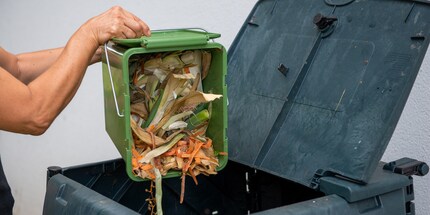
Generally speaking, you can compost all kitchen and garden waste. In other words, anything organic is compostable. However, there are some exceptions I’ve listed in the next section. Compostable waste includes:
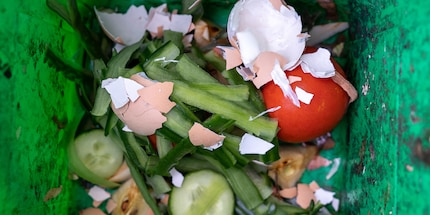
Anything non-organic shouldn’t be composted. Some organic waste only decomposes very slowly. For this reason, it shouldn’t be composted at all or only if it’s been shredded into small bits. Non-compostable organic waste is best disposed of in your household bin; the rest can be brought to an appropriate collection point. The following things shouldn’t be composted:
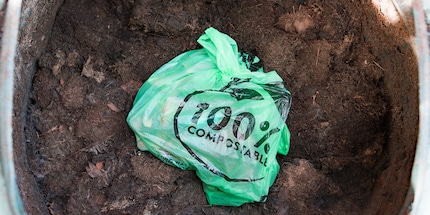
By following the above tips, you’ll help reduce waste and do something sustainable for the environment. Compost the right way and you’re giving leftovers a second chance and taking the opportunity to give something back to nature. The humus produced by the compost fertilises gardens, plants and trees. The green waste collected by the city or your local community produces biogas, which in turn benefits you and the planet. By separating your household waste and making use of compostable leftovers, you’ll be using fewer expensive bin liners and will become part of the natural cycle at the same time.
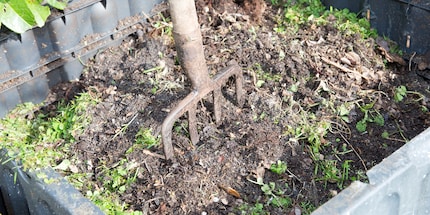
When I'm not stuffing my face with sweets, you'll catch me running around in the gym hall. I’m a passionate floorball player and coach. On rainy days, I tinker with my homebuilt PCs, robots or other gadgets. Music is always my trusted companion. I also enjoy tackling hilly terrain on my road bike and criss-crossing the country on my cross-country skis.
Practical solutions for everyday problems with technology, household hacks and much more.
Show all